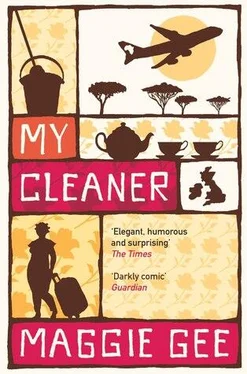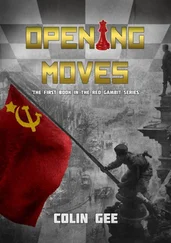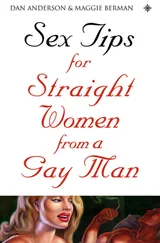“You all do well because you stick together,” she says, tomato sauce congealing on her upper lip. “And now the English give you all the jobs, and all the money, because you coloured. I’m not bein’ funny, you two my friends. But how come you both rich and I’m still poor? I been in England a lot longer than you. Nobody does any favours for Juanita.”
“I am not rich,” says Mary. “And no one did any favours for me. Only my friends, like Abdu and Leanne.” But she sees Juanita is very unhappy. “You too, Juanita. I do remember. When I had to stay home with Jamey, one day, you covered for me, so I got my money.”
“Of course,” says Juanita, brightening. “Is the story of my life. I help everybody, always.” She tells a few stories to illustrate this, which are very long and incoherent, and then they start remembering their youth, so they are all laughing again, over coffee: about how Mary put salt in the supervisor’s tea: how Abdu locked a sneak in the stock cupboard.
The conversation becomes sober again when Juanita asks how Jamey is. “Clever little boy, innit?” she says. “Lovely dark eyes, just like his dad. Though I never understand how you could marry one of them.”
“Don’t forget that Abdu is a Muslim too,” says Mary quickly, but Abdu shrugs and smiles. Mary has dreaded being asked about Jamey, but once she starts to talk, it is almost a relief. “Ugandan Muslims aren’t strict like Omar. Well he wasn’t at first, but as he grew older…Remember Omar was Libyan. And he worked for the embassy, of course. Maybe he thought I was holding him back. He changed. People change. He began to believe he could find someone better. Younger, less stubborn. A good Muslim.” Now the words come less easily. “And he thought — it would be better for Jamie too. When we were posted back to London, things really went wrong. Omar grew afraid of all the godlessness here. He thought that Jamil would be sucked in. Maybe find a non-Muslim girlfriend, because what? Because Omar himself had done the same. And so—” Mary stops, and takes a gulp of water. It still seems shameful to tell what happened. “Omar told me that he was going to divorce me. And before I knew it, he had gone back to Tripoli. Taking Jamil. Then he married again. I met her twice. She is not so bad. Sometimes she tells me things on the phone. In any case, things did not work out. Jamil and his father began to quarrel. Maybe Jamie blamed him for the divorce. And Omar was worrying about him again. You see, out in Tripoli, their rich young men…they are educated, they all have degrees, but later there is no work for them. They are too proud to do — jobs like ours, so they lie around all day, watching bad films and drinking.”
“So Jamil got into bad company?” Juanita’s mouth is sorry, but her eyes are excited.
It is suddenly too hard for Mary to go on. Because what can Juanita understand about her life? The little Spanish woman has still got two children, whatever may be wrong with them, and one grandchild. It seems like such riches. Mary is too proud to show her cupboard is bare.
She makes herself smile. “No, his father imagined it. He worried too much. Jamie has always been a good boy. He has got a place to do Veterinary Studies, at Al Fateh University, in Tripoli.”
“Ha! Very clever!” says Juanita, but she pouts, and is restless, inspecting her gold bracelet. “My kids, they don’t need to be brainy, do they? No importa , they both earning money.” Reluctantly, she returns to Jamil. “So now he is going to be a student, you are happy, even if you don’t see him for a bit.”
And Mary nods and changes the subject, because she cannot bear to finish the story, though its empty sadness runs through her body. She tries, every day, not to think about it, except at night, when she says her prayers. For although she has told Abdu and Juanita no lies — Jamie has won a place to do Veterinary Studies, Mary does believe he is a good boy — she has not told them the whole story. Indeed, she does not know the whole story. Her heart yearns towards him: Jamie, Jamie .
“Ladies, I am going to pay for lunch,” says Abdu. “Juanita, I admit I am rich! As rich as Donald Trump, at least. England has been quite kind to me. I have my family. I like my weekends. And my kids, you know, they are Londoners. Though they like to check out Club Afrique, and Kabira.”
“Don’t you ever miss Kampala?” Mary asks. “It is OK where I am. The room is nice. The work is very easy for me. But I miss Uganda. I miss my language. Tugenda kwelabiila baani betuli .”
“Honestly?” says Abdu. “I only miss the weather. How could I go home again, and sometimes not have electricity, for hours on end? Nowhere to shop, no opportunity? You see, Mary, Uganda is here. In Forest Gate and New Ham, it is Uganda. So many Baganda here, it is like home. We have even got our own football team! Simba FC is a brilliant team. And our own radio station, every Sunday!”
“It’s just like I said,” Juanita nods but without venom, she is even smiling, this proves her point. “You Africans are taking over, in London.”
Abdu sees that Mary is looking sad. “Things have been different for you, Mary. Because you married a husband from another country.”
“I married a husband from another country,” she repeats. “It is true, Abdu. So far away. I married for love—”
“So did I,” says Juanita. “I got nothing but trouble from that man. If my girl goes wrong, is because of ‘im.”
“It’s my son,” says Mary, but then can’t continue. “I am only sad about our son.” And because Mary will not cry in public, she smiles a brilliant smile, and gets up from the table.
Abdu pays the bill, and then looks at them, his two friends, these two different women. “God,” he says, “will take care of them, inshallah . God will look after all lost children.”
Vanessa does not notice when her house is clean; she only notices when it is dirty. But in fact, the house is better now Anya is cleaning it. The bathroom smells of lemons again. The wastepaper baskets shed their ragged crowns of newsprint. The flowers in the dining room are fresh, and the vases are no longer surrounded by brown petals, lying on the table like a ruff of spilled tobacco. The dado- and picture-rails are white, where once they were traced with long smears of soft charcoal.
Anya likes cleaning. She is glad to have a job, and she thinks that Justin is mysterious and handsome. She wipes the mouthpiece of the phones, which she thinks must be bubbling over with germs. As she puts it down, it rings, insistently. This morning it has rung a lot.
Vanessa is irritated by the phone, because she is getting too much marking from the new Creative Writing intake. It is her day off from college, but she hasn’t left her desk. The dark-eyed boy, Derrick, is quite good, and very keen, one of those who are constantly submitting writing. He has two obsessions: pigeons and knives. They have not yet started to drive her to distraction. She scrawls, “Well done again, Derrick. Juxtaposition of central motifs once more consistent and compelling.” If the telephone shrills when she is at her desk, encouraging, describing, validating, Vanessa tends to be ruder than usual, and slams the receiver back into its cradle.
It is the foreigners, the foreigners again. They ask for the wrong people, in uncertain intonations, either very tentative or very bossy. They ring with news of prizes for ‘Mr Henman’, or offers of new kitchens, or phones, or loans, or cheaper gas or electricity, and Vanessa gets mad, and begins to cut them off as soon as she hears a voice that isn’t English, although she would be shocked if this was pointed out.
Читать дальше












